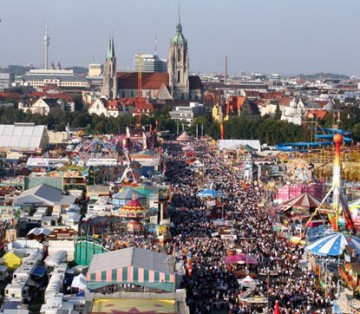Originally published in the Northside San Francisco in November 2011
“Thus you can throw yourself flat on the ground, stretched out upon Mother Earth, with the certain conviction that you are one with her and she with you.” –Alan Watts
I took the long way to Munich, Germany. Over ten days I visited London, Paris, Zurich, and Munich. I’d never considered attending Oktoberfest until a ticket was magically gifted to me.
Magic is the right word to describe the whole trip, actually. Just imagine the everyday act of getting on a plane; a giant metal tube carries you at 30,000 feet, and when you emerge you’re in another part of the world. From London I took the train because once you’re in Europe it’s more fun to see everything at ground level instead of above the clouds.
Situated in my hotel room in Paris, I opened the balcony doors to smell the crisp pre-autumn air. Living in Los Angeles makes one appreciate a clean breeze. In front of that open window I read a dog-eared paperback by Alan Watts called “The Book (On the Taboo of Knowing Who You Are)”, and one particular chapter called “The World is Your Body”. Watts dismantles the myth of separation on a macro and microcosmic level.
There’s certainly no sense of separation on the streets of Paris. In an outdoor café, I had a fantastic meal while conversing with the chef about Proust’s Paris. Locals at adjacent eateries, merchants in doorways—some listened and started chiming in with their opinions. All this at 11:30p.m. on a Tuesday night! What a great city.
On the train from Paris to Zurich I passed herds of grazing cows and sheep on rolling green hills punctuated by the occasional storybook cottage that looked like it might be made of gingerbread. While touring Zurich, I realized that the city’s unusual beauty comes from a history lacking the scars of war. Everything has been meticulously preserved, nothing rebuilt. I enjoyed a few traditional dinners, one in the lower village which bustled with local foot traffic and the music of street musicians.
In Munich I met up with my American colleagues just across from the Munich opera house. This was the first night of Oktoberfest, and the party moved to the Hofbrauhaus, the most famous beer hall in the world. The place was packed and smiling girls in traditional Bavarian garb handed us frosty one liter mugs of beer at every turn (Paulaner was my favorite local beer). Munich was positively teeming with tourists. Normally 1.4 million occupy the city. During Oktoberfest, which is the largest Volksfest (People’s Fair) in the World, that number rises to over 6 million. Nevertheless the locals remained consistently patient and courteous.
During that weekend I visited the Dachau concentration camp memorial site. As the first prototype concentration camp of the Nazi regime, this factory of death is one of the most obscene scars of war that a person can witness. Now it exists in tribute to the victims who suffered and died there, and the dead admonish the living to remember.
A local cab driver named Peter was my unofficial guide for much of my stay in Germany. Another stroke of luck to meet one of those cabbies that has an encyclopedic knowledge of his town’s history combined with the extroversion and energy needed to put up with not-always-sober revelers. We bonded over a mutual appreciation of San Francisco, Jello Biafra and Evel Knievel– that’s how The Dead Kennedys became the soundtrack to my Munich tour.
Everywhere I went, I felt right at home. Based on my experience, Europe is generally positive on American tourists. Knowing basic French and German phrases helped. I gave Oktoberfest a hearty thumbs up. It’s the biggest party in the world with more hospitality, festivities, delicious food and high quality beer than one could consume in a lifetime.
